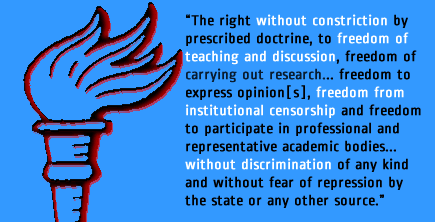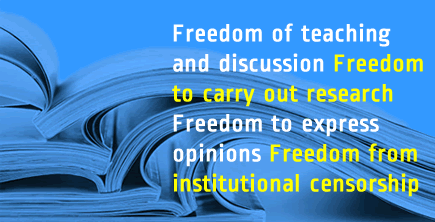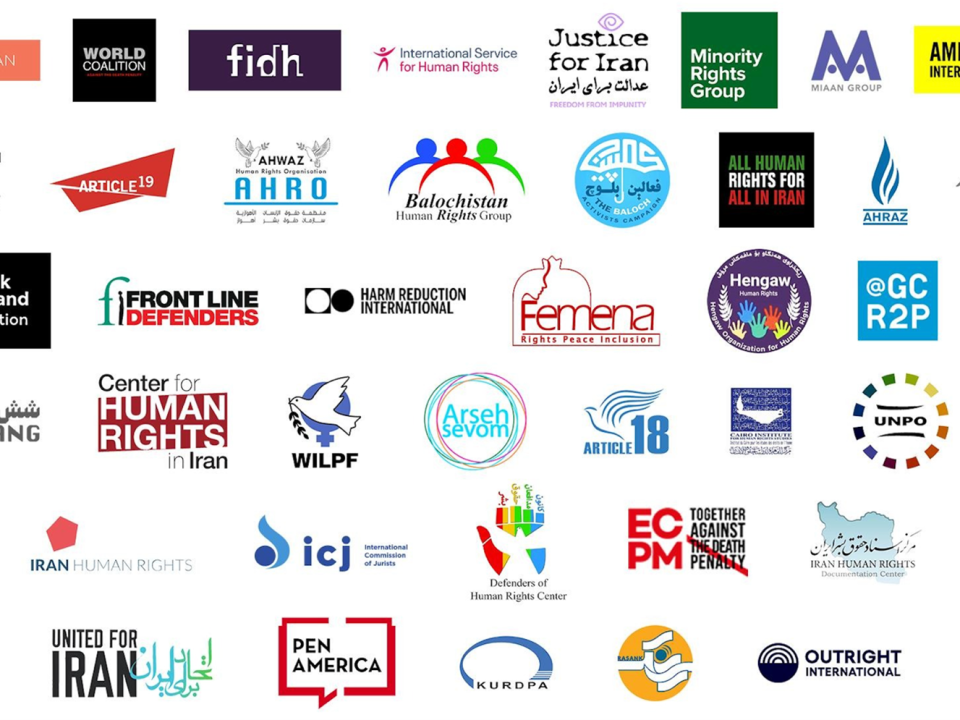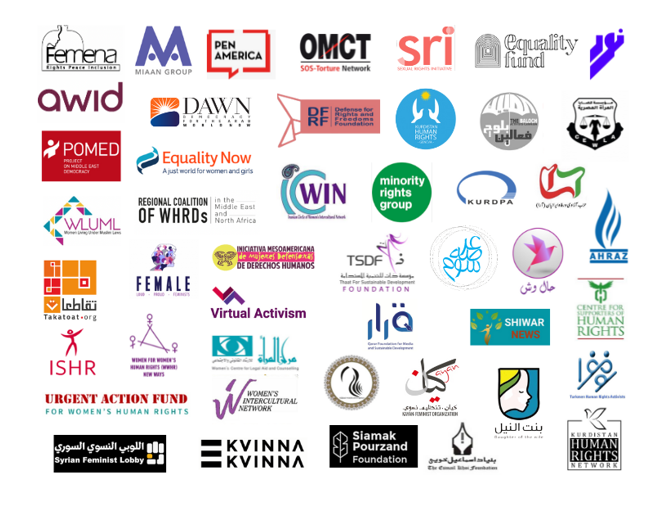
17 NGOs Call on Iran to Uphold the Right to Education and Academic Freedom
May 31, 2012Cartoonists Protest Ruling Against One of Their Own
June 3, 2012Abdorrahman Boroumand Foundation * Amnesty International
* Arseh Sevom * ARTICLE 19 * Bahá’í International Community
* Committee of Human Rights Reporters
* Cairo Institute for Human Rights Studies
* Green Students for a Democratic Iran – Southern California
* Human Rights Activists in Iran * Human Rights Watch
* International Campaign for Human Rights in Iran
* International Federation for Human Rights
* Iran Human Rights Documentation Center
* Iranian League for the Defence of Human Rights
* Society to Combat Discrimination in Education
* Iranian Democratic Student Association of George Washington University * United for Iran
The above signatories representing 17 human rights and student organizations express deep concern about the alarming state of academic freedom in the Islamic Republic of Iran, in particular violations of the rights to freedom of expression, association, and assembly on campuses; and institutionalized procedures that allow authorities arbitrarily to expel and suspend students, and fire graduate instructors on the basis of their political views or activities. Over six hundred students, as well as some university lecturers, have been arrested since 2009, many of whom have subsequently been imprisoned, and hundreds deprived of education, as a result of their political activities.
The right to education for all persons without discrimination is explicitly guaranteed under international instruments, which Iran has accepted or to which it is party, including the Universal Declaration of Human Rights, the International Covenant on Economic Social and Cultural Rights (ICESCR), and the UNESCO Convention against Discrimination in Education. It is also guaranteed under Iran’s Constitution. The International Covenant on Civil and Political Rights (ICCPR) and the International Convention on the Elimination of Racial Discrimination (CERD) further protect the rights of individuals to freedom of opinion, expression, association, and assembly, and prohibit discrimination against any person due to their race, sex, religion or belief, ethnicity, or political or other opinion. The ICCPR also protects the right of minorities, in community with others, to enjoy their own culture, to profess and practice their own religion, and to use their own language.
In the International Covenant on Economic Social and Cultural Rights’ General Comment 13 from 1999, academic freedom is explained as including:
“the liberty of individuals to express freely opinions about the institution or system in which they work, to fulfill their functions without discrimination or fear of repression by the State or any other actor, to participate in professional or representative academic bodies, and to enjoy all the internationally recognized human rights applicable to other individuals in the same jurisdiction.”
Additionally, General Comment 13 of the ICESCR states that “the denial of academic freedom of staff and students” would be a violation of Article 13 of the ICESCR.
UNESCO’s 1997 Policy Recommendation Concerning the Status of Higher Education Teaching Personnel also provides that the right to education “can only be fully enjoyed in an atmosphere of academic freedom and autonomy for institutions of higher education.” Academic freedom is defined as:
“the right without constriction by prescribed doctrine, to freedom of teaching and discussion, freedom of carrying out research and disseminating and publishing the results thereof, freedom to express opinion[s], freedom from institutional censorship and freedom to participate in professional and representative academic bodies […] without discrimination of any kind and without fear of repression by the state or any other source.”
The UNESCO Policy further provides that professors should not be forced to instruct against their own best knowledge and conscience, to use curricula or methods contrary to international human rights standards, or be subject to dismissal for any reason without sufficient cause related to professional conduct and demonstrable before independent and impartial third party hearings. According to these standards, higher education institutions should support academic freedom and fundamental human rights, ensure students are treated fairly and justly, adopt policies that ensure equitable treatment of women and minorities, and ensure that higher education personnel are not impeded in their work by violence, intimidation, or harassment.
Yet, students and higher education personnel in Iran continue to face routine and pervasive violations of their rights on the basis of their opinions, gender, religion and ethnicity. The Network for Education and Academic Rights, an independent non-governmental organization that monitors academic freedom, documented at least 92 violations of academic rights in Iran in 2011. According to the largest independent student organization in Iran, Daftar-e Tahkim Vahdat, between March 2009 and February 2012, there were at least 396 cases of students banned from further study by the Ministry of Science, Research, and Technology as a result of their peaceful political or other dissent. Additionally, at least 634 students were arrested by security and intelligence organs and 254 students convicted for similar reasons, with the correlated impact on their ability to continue their education. The Ministry of Science, Technology, and Research declared Daftar-e Tahkim-e Vahdat an “illegal” union in 2009, on grounds that it “engaged in activities that endangered national security.”
The organizations said that they had gathered information that the Iranian authorities have threatened, suspended, arrested, prosecuted, and sentenced student activists for peaceful criticism of government policies on a regular basis. Officials also have routinely shut down hundreds of student gatherings, publications, and independent organizations. More than 30 students are currently serving long prison sentences in Iran solely for exercising their rights to freedom of expression, association, and assembly by expressing their opinions, participating in demonstrations, or membership of an independent student organization critical of government policies. Combined, these students have been sentenced to more than 130 years in prison, in some cases up to 15 years.
The organizations expressed further concern that the Iranian government also appears to vet students for admission to graduate programs as well as applicants to higher education teaching posts based on their ideological views. The Supreme Council for the Cultural Revolution sets ideological and political requirements for students seeking higher education as a strategy of deterring dissent on university campuses. These regulations require students to have faith in Islam or other state-recognized religions, and be judged “not to be hostile” to the Islamic Republic, and free from “moral corruption.” The regulations are then used by the Ministry of Intelligence, the Ministry of Science, Research and Technology and university “disciplinary committees” to arbitrarily pressure and punish students on the basis of their views, including banning them from admission and enrollment. As such they violate Article 3 of the Iranian Constitution guaranteeing the right to education for all citizens.
The organizations also highlighted that Iran’s paramilitary and intelligence apparatuses, including the Basij militia, maintain an active presence on university campuses and engage in violent confrontations with students, including repeated attacks on peaceful gatherings and dormitories leading to serious injuries and the deaths of several students. While such attacks on Iranian university campuses are not new, an increased number of instances have been carried out across the country since the 2009 disputed elections.
In addition, Iran’s minorities face systematic deprivation and discrimination in higher education. Authorities have prevented–and specifically targeted–members of the Bahá’í faith from pursuing higher education solely on the basis of their religious beliefs, as specified in regulations by the Supreme Council of the Cultural Revolution that require faith in Islam or state-recognized minority religions that exclude the Bahá’í community. The organizations said they were aware of hundreds of qualified Bahá’í students who are banned from entering public and private universities and vocational training institutes in Iran. In 2011, authorities raided the Bahá’í Institute for Higher Education (BIHE), an online correspondence university created in 1987, and arrested and jailed thirty members of the BIHE. At least nine educators have been convicted of charges relating to the peaceful exercise of their right to freedom of expression, association, and assembly, of whom up to seven are currently believed to be in prison.
Student activists that advocate for ethnic minority rights often face the harshest punishments by Iranian authorities for voicing their discontent with discrimination against them. This includes arbitrary and sometimes violent arrests, heavy sentences, and, in some instances, the death sentence. For example, in 2011, four members of the Democratic Union of Kurdish Students were arrested and several others summoned to security and intelligence offices.
Furthermore, discrimination against women has increased within Iran’s higher education system. Gender segregation introduced recently in some universities raises questions about whether women and men will continue to enjoy equal access to the same quality of higher education, subject to capacity, as is required under international law. Reports of quotas restricting women’s admission to specific university programs implemented by the Ministry of Science, Research and Technology, indicate that women are facing increasing restrictions in their ability to exercise their right to access higher education without discrimination. The quotas appear designed to reduce women’s access to specific fields of study and increase the overall proportion of male admission to Iranian universities. Such restrictions on women’s educational choices violate the prohibition on discrimination and Iran’s obligations under international law, to ensure the equal rights of men and women to education. In addition, in a recent disturbing incident at the Roudehen Branch of Islamic Azad University in April, university security personnel insulted and beat female students whom they believed were not complying with hijab [Islamic dress] standards.
The situation of higher education teaching personnel is not much better. The Iranian authorities have dismissed over one hundred academics from their posts since the 2009 election on the basis of their political views and dissent against the government contrary to their obligations under Article 13 of the ICESCR to ensure academic freedom and institutional autonomy. Several university lecturers are serving prison sentences solely for peacefully expressing opposing views from the state.
Finally, the Ministry of Science, Research, and Technology has instituted a program of “adapting” certain fields of study to Islamic ideology as defined by the government, including law, women’s studies, human rights, management, arts and cultural management, sociology, social sciences, philosophy, psychology, and political science. Such a policy amounts to a violation of academic freedom through direct censorship and ideological control of higher education.
The organizations strongly urge the Iranian authorities to fulfill Iran’s international obligations to ensure respect for the right to education and academic freedom by:
- Releasing immediately and unconditionally all Iranian students and higher education personnel who have been jailed for peacefully exercising their rights to freedom of expression, association, and assembly, including educators at the Baha’i Institute of Higher Education, and including those who have expressed political opinions (lists provided below);
- Ending the systemic identification and targeting of students due to their beliefs, or their religious, political or civic activities, and revising regulations for admissions and “disciplinary committees” to ensure they uphold and respect the principles of free expression, assembly, and association;
- Removing all intelligence units and Basij paramilitary units from university campuses;
- Allowing peaceful, independent Iranian student organizations to operate freely and without interference from government authorities and organs;
- Abolishing discriminatory policies against women, including the quota system that restricts women’s participation in higher education, gender segregation which may lead to women experiencing discrimination in higher education, and restrictions on campuses and fields of study in which women can enroll; and ending enforcement of clothing standards that violate the rights to privacy, freedom of expression and freedom of religion or belief;
- Abolishing all policies and practices that discriminate against or otherwise violate the rights of religious and ethnic minorities in Iran, particularly the Baha’i community, including in regard to their access to higher education and academic freedom;
- Ending the practice of hiring, promoting or firing higher education teaching personnel based on their personal and political opinions and establishing independent university committees to review and reinstate professors that have been dismissed on ideological and politically motivated grounds; and
- Ensuring that the governance, curricula and procedures for enrollment in universities are independent from government control and free from ideological vetting, including by the Supreme Council of the Cultural Revolution, and that they adhere to international standards of academic freedom outlined by UNESCO and the ICESCR.
Students imprisoned in Iran
Bahareh Hedayat; Zia Nabavi; Majid Dorri; Majjid Tavakoli; Ieghan Shahidi; Ali-Akbar Mohammadzadeh; Ali Malihi; Hassan Asadi Zeidabadi; Hamed Omidi; Saeed Jalalifar; Mehdi Khodaie; Milad Karimi; Babak Dashab; Hamed Rouhi-Nejad; Hossein Ronaghi-Maleki; Shahin Zeinali; Arash Sadeghi; Javad Alikhani; Omid Kokabi; Habibollah Latifi (on death row); Shabnam Madadzadeh; Atefeh Nabavi; Fereshteh Shirazi; Afshin Shahbazi; Rouzbeh Saadati; Mehrdad Karami; Ali Jamali; Mohammad Ahadi; Rouhollah Rouzi-Talab; Sama Nourani; Emad Bahavar; and Kaveh Rezaei Shiraz.
Higher education personnel imprisoned in Iran
Masoud Sepehr; Ghorbanali Behzadian Nezhad; Ghasem Sholeh-Saadi; Davoud Soleimani; Mohsen Mirdamadi; Zahra Rahnavard (house arrest); and Ahmad Miri.
BIHE educators
Mahmoud Badavam; Riaz Sobhani; Ramin Zibaie; Farhad Sedghi; Nooshin Khadem; Kamran Mortezaie; and Kamran Rahimian.





